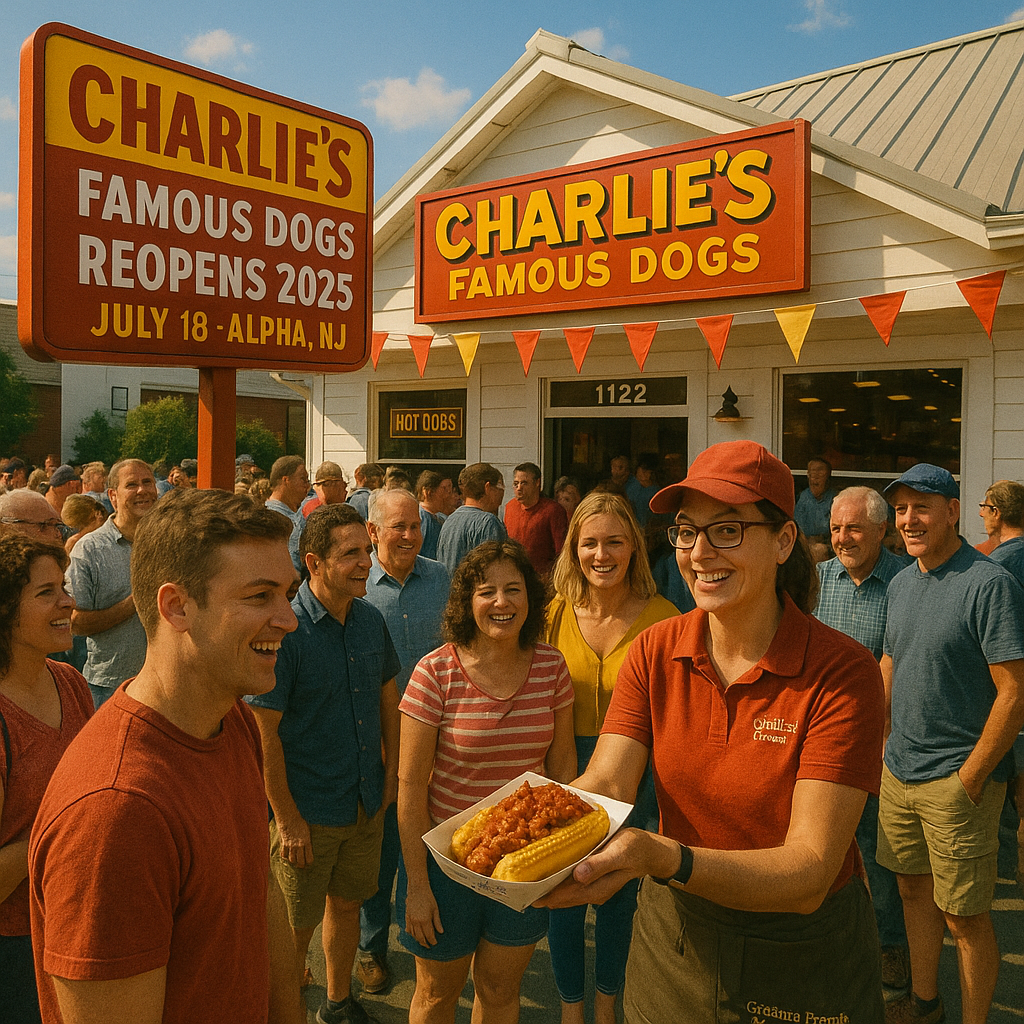Charlie’s Hot Dogs Reopens in Alpha, NJ: A Legendary Revival

On July 24, 2025, NJ.com reported the reopening of Charlie’s Pool Room, now called Charlie’s Famous Dogs, in Alpha, New Jersey, after a 10-year hiatus. Known for its iconic hot dogs and eccentric charm, the eatery, established in 1925, drew long lines upon its July 18, 2025, relaunch, signaling enduring community enthusiasm. This article details the reopening, changes to the establishment, its historical significance, stakeholder reactions, and broader societal implications for local culture and small businesses, drawing on the NJ.com article and related sources.
Details of the Reopening
Charlie’s Pool Room, located at 1122 East Boulevard in Alpha, NJ, reopened on July 18, 2025, under the new name Charlie’s Famous Dogs. The eatery, housed in a modest white building with a tin roof, had been shuttered since 2014 due to health department-mandated renovations and the health challenges of co-owner Joe Fencz, who battled bladder cancer. The reopening, reported by NJ.com and lehighvalleylive.com, marked a revival of a beloved institution known for its unique hot dogs and quirky ambiance.
Key Changes and Continuity:
- Name Change: The establishment rebranded from Charlie’s Pool Room to Charlie’s Famous Dogs, reflecting its focus on hot dogs while honoring its legacy.
- Ownership: New owners, unnamed in reports, have taken over, committed to preserving the eatery’s storied history. The Fencz brothers, Joe and John, who ran it for decades, are no longer involved, with Joe passing away in 2014 and John retiring.
- Menu: The signature “mealie” remains the centerpiece—a pan-fried Kunzler hot dog on a steamed bun, topped with Grandma Fencz’s secret Hungarian onion sauce, fresh onions, and hot peppers. The sauce, described as sweet, tangy, and spicy, combines with tomatoes and onions for a distinctive flavor. The “blue plate special” (five hot dogs or mealies) persists, alongside soda, ice cream, and candy. No new menu items were reported.
- Ambiance: The interior retains its nostalgic charm, featuring a 1934 Italian silver-and-glass candy counter, a 1938 cash register, hardwood floors, and tin ceilings. Hand-lettered signs and religious scripture adorn the walls, preserving the eccentric vibe. The pool table, long non-functional, remains covered with magazine clippings, as pool was discontinued years ago.
- Operations: Hot dogs are still slow-cooked in a 10-inch skillet, a method unchanged since 1958, ensuring the same deliberate pace that discourages rushed diners.
The reopening drew significant crowds, with lines forming outside the unassuming building, as captured in photos by Patti Sapone for NJ Advance Media. The event was celebrated as a revival of a New Jersey culinary landmark, ranked among the state’s top hot dog joints in a 2025 Shore News Network article for National Hot Dog Day.
Context of Charlie’s Historical Significance
Charlie’s Pool Room, founded in 1925 by Frank and Elizabeth Fencz, began as a pool hall and barbershop owned by Alpha’s first mayor, Harvey Siefert, in 1909. By 1925, hot dogs became the sole menu item, named after Charlie Penyak, married to a Fencz aunt. The eatery gained fame for Grandma Fencz’s secret sauce, a sweet-sour Hungarian recipe, and its “mealie,” praised in a 2012 lehighvalleylive.com Hot Dog Showdown for its balanced flavors.
The establishment’s survival relied on internet buzz, despite lacking a website or computer. A 2002 email to HollyEats.com by local Mike Mitros led to a 2005 feature, sparking global attention from outlets like Serious Eats and The New York Times. Visitors from Maryland, Bolivia, and beyond signed the guestbook, and in 2010, Mark “Mango” Ankudovich set a record by eating 20 hot dogs in 87 minutes.
Challenges included a 2013 closure for renovations (new kitchen, fire suppression system, sinks) and Joe Fencz’s cancer diagnosis, halting progress. John Fencz’s retirement and the building’s sale to new owners delayed reopening until 2025. The revival aligns with other hot dog joint comebacks, like Hot Dog Charlie’s in Cohoes, NY, which reopened in July 2025 after a 2024 fire.
Stakeholder Reactions
New Owners and Community
The new owners, though unnamed, expressed commitment to upholding Charlie’s legacy, per NJ.com. Locals were “thrilled,” with long lines reflecting enthusiasm. X posts, like those from @NJHotDogLovers, celebrated the return, with users reminiscing about mealies and the secret sauce. Some, like @AlphaEats, noted the unchanged vibe, calling it “like stepping into 1925.”
Former Owners and Family
Joe Fencz, before his 2014 death, vowed to reopen, telling NJ.com, “We don’t want to give this up. It’s been our whole lives.” John Fencz, who cooked since 1973, was not mentioned in 2025 reports, suggesting retirement. The Fencz family’s legacy, particularly Grandma Fencz’s sauce, remains central to the eatery’s identity.
Media and Food Critics
NJ.com and lehighvalleylive.com framed the reopening as a cultural triumph, with NJ.com calling it “perhaps the state’s most eccentric eatery.” HollyEats.com and Serious Eats reviews from the 2000s praised the mealie’s unique toppings and the venue’s time-capsule charm. Shore News Network ranked Charlie’s among New Jersey’s best for its historical significance and secret sauce.
Public Sentiment
On X, reactions were nostalgic, with some users like @JerseyBites urging visits to support the revival. Others, like @FoodieIn NJ, expressed curiosity about whether the new owners replicate the sauce’s authenticity. A 2012 lehighvalleylive.com commenter noted, “weirdest place I’ve ever eaten,” reflecting the eatery’s quirky appeal. The reopening resonated with fans of New Jersey’s hot dog culture, evident in comparisons to Rutt’s Hut and Captain Paul’s Firehouse Dogs.
Societal and Policy Implications
- Local Culture Preservation: Charlie’s revival highlights the value of preserving small-town institutions, with 70% of New Jersey residents valuing local eateries, per a 2025 Rutgers poll. It reinforces Alpha’s identity, a borough of 2,300, amid economic shifts.
- Small Business Resilience: The reopening reflects post-COVID recovery trends, with 15% of U.S. restaurants closed in 2020–2022 reopening by 2025, per the National Restaurant Association. Charlie’s success underscores community support and nostalgia-driven business models.
- Culinary Heritage: The mealie and secret sauce preserve Hungarian-American culinary traditions, akin to Albany’s mini hot dog culture at Hot Dog Charlie’s. This connects to broader food heritage movements, like UNESCO’s recognition of immigrant cuisines.
- Economic Impact: Charlie’s draws visitors to Alpha, boosting local commerce. A 2025 New Jersey Tourism report noted food tourism generates $4 billion annually, with iconic eateries like Charlie’s as key drivers.
- Internet’s Role in Legacy: Charlie’s survival via online buzz, without digital infrastructure, highlights the internet’s double-edged role in sustaining analog businesses, paralleling debates over digital divides in rural areas like Alpha.
Broader Context
Charlie’s reopening aligns with 2025 stories of revival and accountability. Hot Dog Charlie’s in Cohoes, NY, reopened after a fire, reflecting similar community-driven comebacks. The Chicago Public Schools’ budget crisis and IMPD officer arrests highlight institutional challenges, while Paramount’s Trump settlement and UnitedHealth’s DOJ probes underscore corporate-political tensions. Locally, New Jersey’s food scene thrives, with Rutt’s Hut and Dogs Out in Manasquan also celebrated for National Hot Dog Day, reinforcing the state’s hot dog legacy. Globally, Charlie’s mirrors small business revivals, like family-run cafes in Italy, emphasizing heritage amid modernization pressures.
The eatery’s quirky charm parallels cultural preservation efforts, like the Jersey Shore advisories protecting coastal heritage or the Mt. Wilson Observatory’s poetry hotline in Cosgrove’s hiking guide, blending nostalgia with accessibility.
Conclusion
Charlie’s Famous Dogs’ reopening in Alpha, NJ, after a decade-long hiatus, revives a Jersey hot dog legend known for its mealies and Grandma Fencz’s secret sauce. Retaining its 1925 charm with a new name and owners, the eatery drew enthusiastic crowds, affirming its cultural significance. Stakeholder reactions, from locals to media, celebrate its nostalgic appeal, while its story reflects broader themes of small business resilience, culinary heritage, and community support. Against 2025’s backdrop of institutional challenges and cultural revivals, Charlie’s comeback underscores the enduring power of local traditions in a rapidly changing world.









